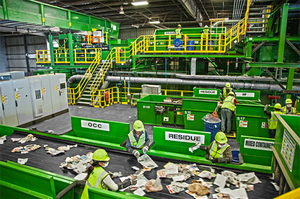NSWMA endorses zero-waste efforts.
It seems as if hardly a month goes by without a community or a waste generator announcing a zero-waste goal or some other dramatic landfill diversion initiative. Recently, the National Solid Wastes Management Association (NSWMA) and its members announced their support of the zero-waste concept.
“Solid waste companies are an important partner in zero-waste efforts,” said Bruce Parker, president and CEO of NSWMA, in a press release. “Zero waste doesn't mean ‘no trash,’ but rather, continuing to find economically achievable ways to treat as much waste as possible as a resource. It means diverting more of the waste stream away from disposal to be recycled or turned into a clean, renewable source of energy. Trash haulers and other solid waste processors will still be needed to make it work.”
In theory, the zero-waste movement seeks to create a waste management system in which all materials are recycled, reused or composted, with nothing remaining for landfills. However, those advocating for zero waste often acknowledge the unlikelihood that all landfilled waste can be eliminated. Instead, they say that aiming for zero waste is the best way to eliminate the maximum amount of waste headed for disposal in landfills.
In a position paper that can be viewed at www.environmentalistseveryday.org, the association states that “America is transitioning slowly but surely to a zero-waste society” and that NSWMA's members are “stepping forward to facilitate a discussion among the public, waste collection service providers, customers, manufacturers, government and consumers on how we can collectively work toward zero waste.”
“It is important to recognize that the transition to zero waste will not be easy or quick,” Parker added in his statement, noting that it took 18 years to double the national recycling rate, from 16.2 percent in 1990 to 33.2 percent in 2008.
“To boost these numbers even further, we will need to continue to expand recycling programs, invest in properly built and permitted processing facilities and cut down on packaging and other waste at the source,” Parker said.
NSWMA's formal support of zero waste comes at a time when aggressive landfill diversion goals, once seemingly exclusive to California and its communities, are spreading throughout the country. For example, Austin, Texas, has adopted a zero-waste goal, and Atlanta may soon launch an effort to reduce the amount of waste it sends to landfills by 75 percent. Earlier this year, Ohio set a goal of a statewide 50 percent landfill diversion rate (the rate was most recently measured at 40.7 percent), and Florida is aiming to increase its statewide recycling rate from its current 28 percent to 75 percent by 2020.
On the waste generator side of the equation, to name just a few examples, Wal-Mart is aiming to eventually send no waste to landfills, and the global financial services company Citi is working to slash its landfilled waste by 40 percent by 2015. Also, the electronics manufacturer Sony has unveiled a goal of reducing its waste generation by 50 percent.
In other landfill diversion news, a section of Barrington, Ill., is the site of a pilot project that could lead to the first program in Illinois that collects both food and yard waste at the curb for composting. Barrington, the Solid Waste Agency of Northern Cook County (SWANCC) and Groot Industries, the private firm contracted to collect waste in the town, are conducting the pilot, which runs through November.
Organics make up nearly half — 49 percent, to be exact — of the residential waste stream in Barrington, according to SWANCC, and food comprises about 8 percent of the organic waste.
Fox Point is the neighborhood in which the Barrington project is being conducted. For more information on the pilot project, visit www.swancc.org/foodwaste.html.
Related Stories
About the Author(s)
You May Also Like




